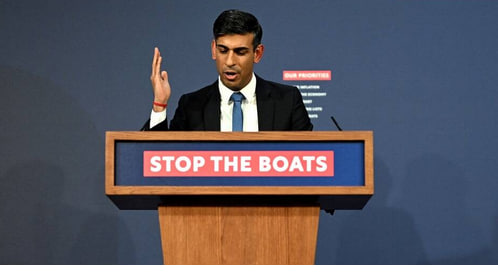Stopping the boats: On the U.K.’s new ‘Illegal Migration Law’
Western democracies are belittling the contribution of immigrants
The UN refugee agency, the UNHCR, has come-down strongly on the U.K. Prime Minister, Rishi Sunak’s plan to pass a new “Illegal Migration Law” that effectively stops the granting of asylum to migrants who reach the U.K. illegally. Mr. Sunak, while standing at a dais marked “Stop the Boats”, said the government is worried about the numbers of those attempting to travel to the U.K. and applying for asylum while on British soil , at considerable cost to the exchequer . Instead, as Home Secretary Suella Braverman explained while introducing the Bill this week, asylum seekers who try to enter illegally would either be returned to their own countries or a “third country”, presumably Rwanda, that has entered into an agreement to provide processing facilities for them. They also face a lifetime ban on citizenship and re-entry to the U.K. According to the UNHCR, the law would contravene international laws, including the 1951 Refugee Convention that Britain is a signatory to. To start with, those who flee their homes and countries often do so without proper paperwork, as they are forced to leave to save their lives. Many of the estimated 45,000 who came to the U.K. on “small boats” last year would have been economic refugees rather than political asylum seekers, and it is problematic that the British government does not make a distinction between the two. The Bill makes exceptions for those arriving directly from the countries they are fleeing, but those would be a small proportion given the short distances “small boats” could travel. The British government, much like the U.S.’s Trump administration that latched on to the equally catchy “Build That Wall” slogan, is long-on political rhetoric , but short on the actual mechanics of making such a plan work, if it fails to be a deterrent to small boats bringing in migrants. In addition, the plan to transport asylum seekers to a third country, apart from sounding neo-colonial , will also come at considerable cost, one that the hapless migrants are unlikely to be able to afford.
The British move is meant to stop the small boats, but must be seen in the larger political context of anti-immigrant and xenophobic beliefs gaining salience in other democracies. While western countries have long quoted international law and convention to India on its plan to forcibly deport Rohingya refugees to Myanmar, or to discriminate on the basis of religion in the Citizenship (Amendment) Act, they must also introspect on their message to the world by enacting such laws themselves. By rejecting asylum seekers and illegal immigrants, nearly all of whom are coming to their shores by braving unsafe routes in search of a better life, they also belittle the real contributions immigrants have made to their societies, including those like the parents of Mr. Sunak and Ms. Braverman, who made their journey from Africa during more welcoming times.
